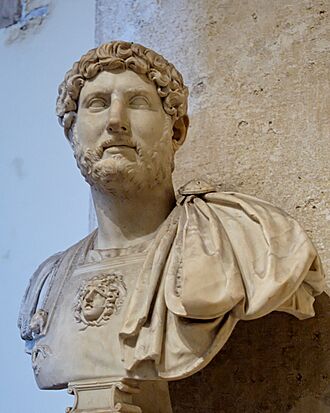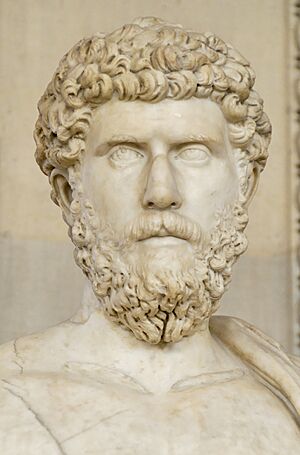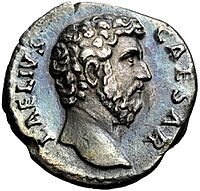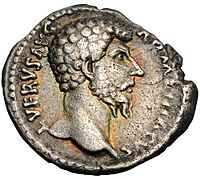Lucius Aelius Caesar facts for kids
|
||||||||||||||||||||||||||||
Lucius Aelius Caesar (born January 13, 101 – died January 1, 138) was an important figure in the Roman Empire. He was the father of Lucius Verus, who later became a Roman Emperor.
In 136 AD, Lucius Aelius was adopted by the reigning emperor Hadrian. This adoption meant he was chosen to be Hadrian's heir, or the next in line for the throne. However, Lucius Aelius died before Emperor Hadrian. Because of this, he never had the chance to become emperor himself. After Lucius Aelius passed away, Hadrian chose Antoninus Pius as his new heir. Antoninus Pius then became emperor later that same year.
Contents
Lucius Aelius's Early Life and Family
Lucius Aelius was born with the name Lucius Ceionius Commodus. When Emperor Hadrian adopted him, his name changed to Lucius Aelius Caesar. His family, the Ceionia family, was well-known in Rome. His father and grandfather, both named Lucius Ceionius Commodus, had served as consuls, which was a very high position in the Roman government. His family came from a region in Italy called Etruria.
Before the year 130 AD, Lucius Aelius married a noblewoman named Avidia. She came from an important Roman family. Lucius and Avidia had at least three children:
- Lucius Ceionius Commodus – He later became Emperor Lucius Verus. He ruled alongside Marcus Aurelius from 161 AD until his death in 169 AD. Lucius Verus married Lucilla, who was the daughter of Marcus Aurelius.
- Ceionia Fabia – She was supposed to marry Marcus Aurelius. However, after Antoninus Pius became emperor, he asked Marcus Aurelius to marry his own daughter, Faustina the Younger, instead.
- Ceionia Plautia
Becoming Hadrian's Heir

For a long time, Emperor Hadrian thought about making his brother-in-law, Lucius Julius Ursus Servianus, his successor. However, as Hadrian grew older, he changed his mind. Servianus was in his nineties and too old to become emperor. Hadrian then considered Servianus's grandson, Lucius Pedanius Fuscus Salinator, as his next heir. Salinator was Hadrian's great-nephew. Hadrian gave him special attention and prepared him to take over.
But in late 136 AD, Hadrian became very ill. While recovering at his villa in Tivoli, he made a surprising decision. He chose Lucius Ceionius Commodus (Lucius Aelius) as his new successor and adopted him as his son. This choice was "against the wishes of everyone." Servianus and young Salinator were very upset. To prevent any problems with the succession, Hadrian decided that Servianus and Salinator could no longer be considered as heirs.
Lucius Aelius's Death
After spending a year serving on the Danube frontier, Lucius Aelius returned to Rome. He was scheduled to give an important speech to the Senate on the first day of 138 AD. However, the night before his speech, he became very ill. He passed away from a sudden illness the next day.
Because Lucius Aelius died, Hadrian had to choose a new heir. On January 24, 138 AD, Hadrian selected Titus Aurelius Antoninus. After thinking about it for a few days, Antoninus accepted. He was officially adopted on February 25, 138 AD.
As part of Hadrian's plan, Antoninus Pius had to adopt two young men himself. He adopted Lucius Aelius's son, Lucius Ceionius Commodus, and Hadrian's great-nephew, Marcus Annius Verus. These two young men would later become important emperors. Marcus became "Marcus Aelius Aurelius Verus" (later known as Marcus Aurelius), and Lucius became "Lucius Aelius Aurelius Commodus" (later known as Lucius Verus). Hadrian also arranged for Antoninus's daughter, Faustina, to marry Lucius.
Later, Marcus Aurelius and Lucius Verus ruled the Roman Empire together as co-emperors. This lasted until Lucius Verus died in 169 AD. After that, Marcus Aurelius ruled alone until his own death in 180 AD.
See also
 In Spanish: Lucio Elio César para niños
In Spanish: Lucio Elio César para niños
 | Aurelia Browder |
 | Nannie Helen Burroughs |
 | Michelle Alexander |




